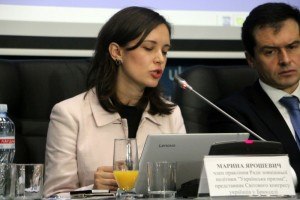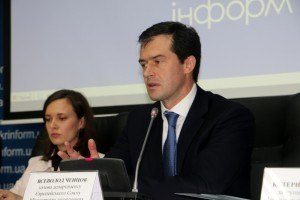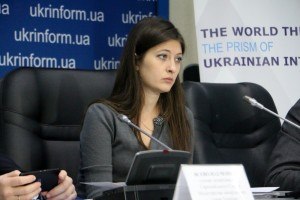After over two years of Russian aggression in Ukraine, the EU still hasn’t developed a joint position. While Ukraine needs a broader mandate of the European missions in Ukraine as well as deeper cooperation in military spheres, Russia may interpret Europe’s hesitancy as a signal for further expansion.
Victoria Zhuhan, Euromaidan Press
Ukraine and EU lack common vision on solving Russia war
 Ukraine and the EU have much mutual understanding in global questions such as cybercrime threats, fighting terrorism, ensuring stable energy supplies, migration crisis, and so on, experts say. When it comes to dealing with local challenges, there is a lack of common vision, Maryna Yaroshevych of Ukrainian Prism Foreign Policy Councilstated.
Ukraine and the EU have much mutual understanding in global questions such as cybercrime threats, fighting terrorism, ensuring stable energy supplies, migration crisis, and so on, experts say. When it comes to dealing with local challenges, there is a lack of common vision, Maryna Yaroshevych of Ukrainian Prism Foreign Policy Councilstated.
The EU and Russia are very interdependent, which makes it extremely hard to accept Russia’s shift from a status of a partner to the status of an offender. For instance, at the current moment Russia still is a participant of many international platforms such as one on solving Syria conflict. On top of that, Yaroshevych added, Russia’s hybrid information warfare makes it extremely difficult for the EU to form resistance while existing EU tools have proved their low effectiveness.
We haven’t yet seen a clear position of the EU, whether Ukraine stands between the EU and Russia, or whether Ukraine and the EU are partners withstanding a common challenge. There hasn’t been a clear answer to this question so far,
Vsevolod Chentsov, Director-General at the Directorate-General for the European Union of the MFA of Ukraine said.
The EU and Russia are very interdependent, which makes it extremely hard accepting Russia’s shift from the status of partner to status of offender.
According to Chentsov, Europe has been so far giving a hybrid response to Russia’s aggression. On one hand, it has been admitted that Russia has violated the international law, on the other hand, Europe keeps spheres in which it finds necessary to maintain cooperation with Russia. For instance, both Russia and Ukraine are considered as EU’s partners in anti-terrorism, whilst Ukraine claims Russia as the terrorist itself.
For Russia, such signals mean that the game it has imposed – the hybrid war – is accepted by the EU. In our opinion, it is vice versa: if Russia’s authorities will see EU’s red lines which it can’t cross, then it will be possible to force Russia into such format of cooperation, that will be comfortable to the EU and Ukraine.”
Ukraine needs greater mandate of EU missions
 Moreover, from the very beginning of the conflict in Eastern Ukraine, the government of Ukraine wanted greater EU involvement in the resolution of the crisis, including a CSDP mission, as stated in the policy paper “Ukraine’s Security Options.” For instance, in winter 2015, the Ukrainian authorities stated a desire for an EU-led peacekeeping mission in Donbas.
Moreover, from the very beginning of the conflict in Eastern Ukraine, the government of Ukraine wanted greater EU involvement in the resolution of the crisis, including a CSDP mission, as stated in the policy paper “Ukraine’s Security Options.” For instance, in winter 2015, the Ukrainian authorities stated a desire for an EU-led peacekeeping mission in Donbas.
However, this idea did not receive a positive response from Brussels due to a lack of unity among EU member-states on the Ukrainian question and the absence of political will on the part of the EU to be involved beyond diplomatic formats.
The experts agreed that the existent EU missions in Ukraine do not currently meet the needs and demands of Ukraine’s society.
For instance, the Red Cross reported that their entry for delivering aid to the occupied territory of the Donbas was blocked and that many of their representatives lost their accreditation there. The OSCE SMM has frequently been unable to function as intended, due to the security situation and the restrictions it encounters, as well as numerous cases of violent behavior towards the observers.
The European Union Advisory Mission in Ukraine functions as if there has been no war in Ukraine.
Ukraine supports a strengthening of the mandate and capabilities of the OSCE Special Monitoring Mission (SMM), and additionally seeks the deployment of a wide international mission in the conflict area, perhaps under the auspices of the United Nations or the EU, working in concert with an armed OSCE mission, the Policy Paper states. Meanwhile, “DNR”/”LNR” representatives continue to prevent the monitoring activities of the OSCE SMM in the separatist-controlled territory, a sign of their attitude towards the international obligations and their desire to hide their non-conformity with the agreements.
According to Zarembo, The European Union Advisory Mission in Ukraine functions as if there has been no war in Ukraine. For instance, there is a clear division between civil and military sectors of cooperation, with the latter one highly undesirable for theEUAM. Zarembo also recalled Ukraine’s State Security System complaining, that the mission didn’t want to support the development of anti-terrorist centers in Ukraine since it could’ve been interpreted as a counteraction to Russian propaganda.
The mandate of the EUAM that does not allow the mission facilitating the conflict resolution does not satisfy Ukraine’s demands, Zarembo stated.



